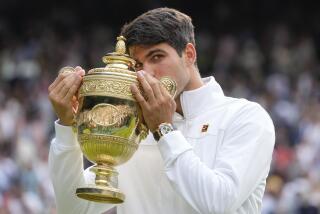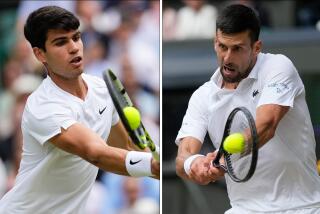Federer Will Depend on Style Points in Final
- Share via
WIMBLEDON, England — If you like contrasts, you’ll love today’s men’s singles final at Wimbledon. Mark Philippoussis of Australia, slow of foot and big of serve, will play Roger Federer of Switzerland, fleet of foot and more magical than muscular.
This is a Lennox Lewis-Roy Jones kind of thing, heavyweight versus cruiserweight.
If Philippoussis lowers the hammer early and knocks Federer down, the status quo of the big bombers at Wimbledon will have been restored. But if Federer is able to float like a butterfly and sting like a bee, this just might become the second straight year that the counterpuncher takes home the big trophy at a place where big serves and volleys are the sacred norm. Last year, the ultimate tennis jabber, Lleyton Hewitt of Australia, won here.
Philippoussis is 6 feet 4 and 202 pounds. He won his semifinal match in straight sets Friday by hitting Sebastien Grosjean with a barrage of big serves and pile-driver volleys that had the 5-9 French baseliner on his heels from the start.
Grosjean said, “Even on the second serve, he was hitting the ball so hard it was difficult. Then, when I was returning good, he volleyed good.”
Federer is 6-1, 177, and while he serves consistently well, it is not the part of his game that fans talk about. After his straight-set semifinal victory over American hope Andy Roddick on Friday, the talk was of court sense, return of serve and a kind of a mystical manner of gliding to the right spot and hitting the right shot at the right time.
Roddick said afterward that he couldn’t even bring himself to be particularly upset about the defeat, since Federer did such a thorough job of taking the match right out of his hands.
“He just played really good tennis today,” Roddick said, recalling as one example a point Federer played near the end of the second set. “I remember thinking to myself, I played a pretty good game to make him serve it out and I lost at love.”
Theories run rampant here as to whether the hammer or the scalpel will prevail.
BBC broadcaster Boris Becker, who won three times here, conjectured that Federer would not be able to merely get his racket on the big serve and float it back against Philippoussis, as he did against Roddick. His thinking was that unlike Roddick, who bombs serves in at 130 mph and then dances on the baseline hoping they won’t be returned, Philippoussis follows his bombs to the net and delivers another bomb with a huge volley.
Others feel that Federer’s speed will enable him to track down those volleys and answer, and that Philippoussis is such a one-dimensional player that his lack of a plan B will be decisive.
No matter who wins today, both players have achieved enough in the fortnight to leave feeling like a winner.
Philippoussis is 26, playing in his 28th Grand Slam event and has been in a final of a major before, at the 1998 U.S. Open, where he lost to countryman Patrick Rafter. But two years ago, he was thinking more about being able to walk again, never mind getting to the final of Wimbledon. He had won the first set of a quarterfinal against Pete Sampras in 1999 here, and was trailing early in the second set when he tore cartilage in his left knee. The injury was so severe that it resulted in three surgeries, the most recent in March 2001. At one point, he spent several months in a wheelchair.
“At that point, I told myself never to look too far ahead,” Philippoussis said. “I had always done that in my career, and I’ve just taken it one day at a time since then.”
He also abandoned a fast-cars-and-nightlife existence in Miami and moved to the little beach community of Cardiff-by-the-Sea in northern San Diego County, where he surfs a lot and says he loves the peace and quiet.
The arrival of Federer, 21, in a Grand Slam final has been expected for some time. He won the juniors here in 1998 and stunned the tennis world by beating Sampras in the round of 16 three years later. Sampras had won 31 consecutive Wimbledon matches, and had earned his seventh Wimbledon title the year before on the same court. Sampras, now semi-retired and unlikely to play here again, won only one more match here, a first-rounder in 2002, before losing to George Bastl, like Federer a Swiss player.
Interestingly, for Federer, those four Wimbledon match victories in 2001 -- he lost in the quarterfinals to Tim Henman after beating Sampras -- were his only ones until this year, and this is his fifth Wimbledon.
Federer, No. 5 in the world, still speaks as if it will never be better than that Sampras match, even if he wins here today.
“Somehow, in my mind, I believe that match will not be able to top,” he said. “He was one of my favorite players, and then to win and get a standing ovation....”
The weather forecast is for a slightly overcast sky with only a 10% chance of rain. If the tennis is anywhere near as good as that, fasten your seat belts.
*
(BEGIN TEXT OF INFOBOX)
Head to Head
Roger Federer (4) leads unseeded Mark Philippoussis, 2-1:
2000
* Davis Cup, indoor carpet, World-Group round-robin, Federer, 6-4, 7-6 (3), 4-6, 6-4.
2001
* Miami, outdoor hard court, round of 32, Federer, 3-6, 7-6 (4), 6-2.
2003
* Hamburg, outdoor clay court, round of 16, Philippoussis, 6-3, 2-6, 6-3.
More to Read
Go beyond the scoreboard
Get the latest on L.A.'s teams in the daily Sports Report newsletter.
You may occasionally receive promotional content from the Los Angeles Times.











